This article was medically reviewed by Sarah Gehrke, RN, MS. Sarah Gehrke is a Registered Nurse and Licensed Massage Therapist in Texas. Sarah has over 10 years of experience teaching and practicing phlebotomy and intravenous (IV) therapy using physical, psychological, and emotional support. She received her Massage Therapist License from the Amarillo Massage Therapy Institute in 2008 and a M.S. in Nursing from the University of Phoenix in 2013.
There are 12 references cited in this article, which can be found at the bottom of the page.
This article has been viewed 41,120 times.
Your fasting blood sugar level, also known as your glucose level, indicates how well your body manages your glucose levels without food in your system. High levels of fasting glucose indicates that your body has a hard time keeping its glucose level stable on its own. It could also indicate that an adjustment needs to be made to the insulin or medication you already take if you have been diagnosed with diabetes. Besides insulin, there are also some other things you can do to help your body maintain its glucose, such as exercise and diet changes. This is especially true if your fasting sugar levels are just slightly above normal and you are not considered diabetic yet.
Steps
Avoiding Early Morning Glucose Spikes
-
1Avoid late night sugary snacks. If you have diabetes and you are continually getting spikes in your nighttime fasting sugar levels, you may need to change your eating schedule. Eating foods late at night that contain a lot of sugar or that can be converted into sugar easily, such as simple carbohydrates, can cause your fasting sugar level to soar.[1]
- There are some diabetics that snack before bed to prevent their blood sugar from getting too low, which is called hypoglycemia. However, regular bouts of hypoglycemia indicate that you should have your medication and insulin schedule adjusted by your doctor.[2]
-
2Lower your blood sugar level before going to sleep. High morning glucose levels can be caused by your levels being high before you go to sleep. Be sure to test your glucose level before going to sleep and reduce them if they are too high. This can be done with insulin or medication or with evening exercise.[3]Advertisement
-
3Adjust your insulin schedule. If you take insulin regularly and you are experiencing morning spikes in your blood sugar, then you should talk to your doctor about this problem. They should work on adjusting your schedule or the amount or type of insulin you take to account for this spike.
- Do not adjust your insulin schedule without first talking to your doctor.
-
4Discuss changing your medications with your doctor. Certain people with diabetes have to take medication in addition to insulin. These medications can help to control spikes in your glucose level and they may need to be adjusted if you are having spikes in your fasting level on a regular basis.
- For example, a person with type 1 diabetes may take an amylinomimetic drug to control how quickly their stomach digests food. Changing how much or how often someone takes this medication can help with high fasting glucose levels.
-
5Use an insulin pump to give early morning insulin. If you are having continual problems with your glucose levels in the morning and medication, insulin, and lifestyle changes have not helped, then an insulin pump may be your best solution. An insulin pump is attached to your body and it injects insulin into your body on a schedule that you set. You can use it to give yourself insulin in the middle of the night if you tend to have a spike in your glucose levels then.[4]
- Because it works even when you are asleep, an insulin pump can help to minimize morning spikes.
Reducing Your Glucose Levels with Dietary Changes
-
1Set a good eating schedule. If you are having a hard time maintaining your fasting sugar level, then changing your eating schedule may be key. Just eating on a regular schedule allows your body to respond more predictably to changes in your blood sugar caused by food. This means that skipping meals can give your trouble. It's also a good idea to discuss your blood sugar problems with your doctor and figure out when the optimal time to eat a meal would be before periods of fasting.
- If your blood sugar levels are getting too high during your sleep it may be because you are eating too close to bedtime. Instead, give yourself some time between eating and going to bed so that you can ensure that your glucose levels are stabilized after digestion.
-
2Reduce the amount of sugar, sodium, fat, and processed foods you eat. In order to get your fasting sugar level under control, it's important to cut out foods that cause spikes in your blood sugar and generally tax your body systems. Cutting them out allows your body to more easily maintain its glucose level, even when not eating.[5]
- Processed foods, such as pre-packaged meals, tend to have extremely high levels of saturated fat, sodium, sugar, and simple carbohydrates.
-
3Eat more whole foods. Whole foods, such as whole grains, lean proteins, fruits, vegetables, and dairy products can help your glucose levels. One reason is that they don't break down into sugar very quickly. These foods also give your system much needed nutrients that can help all body systems, including those that control your blood sugar.[6]
- A great lean protein to eat is fish. Fish contains both healthy fats and lean protein, which is better for maintaining your blood sugar level than protein sources that are higher in saturated fat, such as beef.[7]
-
4Focus on eating a balanced diet. In general, your body needs a balanced diet to operate at its best. By giving yourself a wide variety of foods, you are giving yourself the key building blocks of a healthy body.[8]
- A balanced diet includes a combination of fruit, vegetables, proteins, grains, and dairy.[9]
Reducing Your Glucose Levels with Lifestyle Changes
-
1Exercise regularly. Exercise is key for helping your body to manage its glucose levels. Regular exercise increases your sensitivity to insulin, which is responsible for keeping glucose levels steady. It also uses up excess glucose that would otherwise be in your system. To get these positive benefits, exercise regularly.[10]
- If you have diabetes, you need to be aware that glucose levels change when you exercise. It's important to monitor your glucose before and after exercise and make adjustments to your insulin accordingly.[11]
-
2Reduce your stress. Stress can have a direct impact on your fasting blood sugar because high blood pressure can also impact your glucose levels. You can reduce your blood pressure with diet changes and medication but stress reduction is also key.[12]
- When reducing your stress focus on both mental and physical stress. Relaxing both your mind and your body are key.
- There are a wide variety of ways to reduce your stress and no one way will work for everyone. The key is to find an activity that brings you joy and relaxes your mind. This could be a hobby, such as sewing, or just a relaxing activity, such as reading a book while taking a bath. Then, when you have figured out what relaxes you, make the time to do that activity regularly.
-
3See your doctor regularly. When you have diabetes, it is important to have medical checkups regularly. This will allow your doctor to keep an eye on your condition and to adjust any medications you are taking. Having regular adjustments to your insulin dosage is an important part of keeping your fasting blood sugar regulated.
- With regular checkups your doctor can also look for medical conditions that can be related to diabetes, such as foot ulcers and nerve damage.
- Regular checkups can also help keep you motivated to make positive changes that will improve your condition.[13]
References
- ↑ https://www.unlockfood.ca/en/ViewPDF.aspx?docid=9078&respgid=2498&lang=en&datemod=2016-10-09%2010:16:11%20PM
- ↑ https://www.mayoclinic.org/diseases-conditions/diabetes/expert-answers/diabetes/faq-20058372
- ↑ https://wa.kaiserpermanente.org/healthAndWellness/index.jhtml?item=/common/healthAndWellness/conditions/diabetes/whenToMonitor.html
- ↑ https://www.webmd.com/diabetes/video/insulin-pump
- ↑ https://www.webmd.com/diabetes/diabetic-diet-6-foods-control-blood-sugar
- ↑ https://www.webmd.com/food-recipes/features/the-whole-foods-diet#1
- ↑ http://www.diabetesforecast.org/2011/jun/the-balanced-diet.html
- ↑ https://www.niddk.nih.gov/health-information/diabetes/overview/diet-eating-physical-activity
- ↑ https://www.eatforhealth.gov.au/food-essentials/five-food-groups
- ↑ https://www.diabetes.org/healthy-living/fitness/getting-started-safely/blood-glucose-and-exercise
- ↑ https://www.diabetes.org/healthy-living/fitness/getting-started-safely/blood-glucose-and-exercise
- ↑ https://www.webmd.com/diabetes/stress-management
- ↑ https://www.health.harvard.edu/diet-and-weight-loss/find-the-weight-loss-plan-that-works-for-you

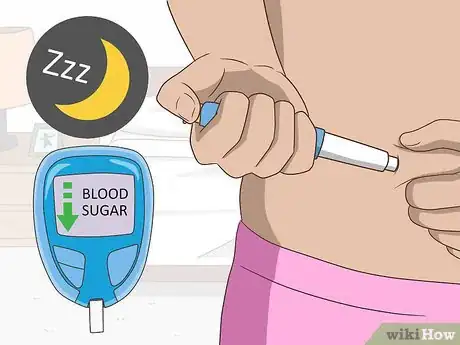
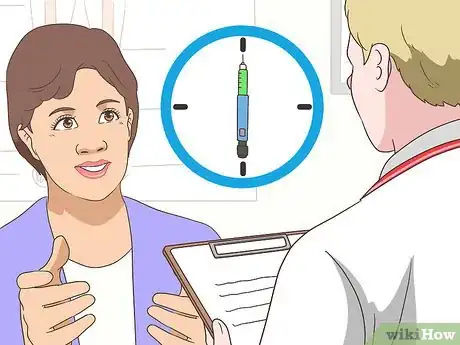

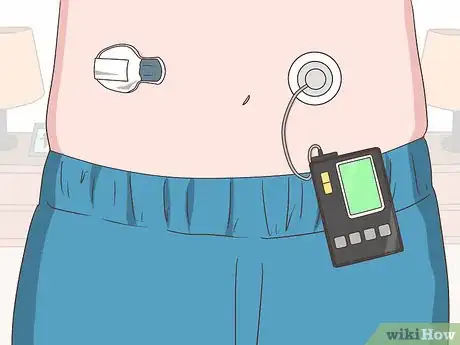
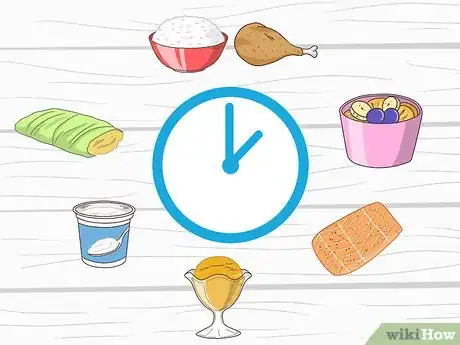
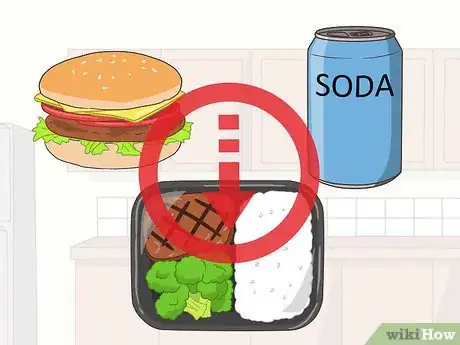





























































Medical Disclaimer
The content of this article is not intended to be a substitute for professional medical advice, examination, diagnosis, or treatment. You should always contact your doctor or other qualified healthcare professional before starting, changing, or stopping any kind of health treatment.
Read More...